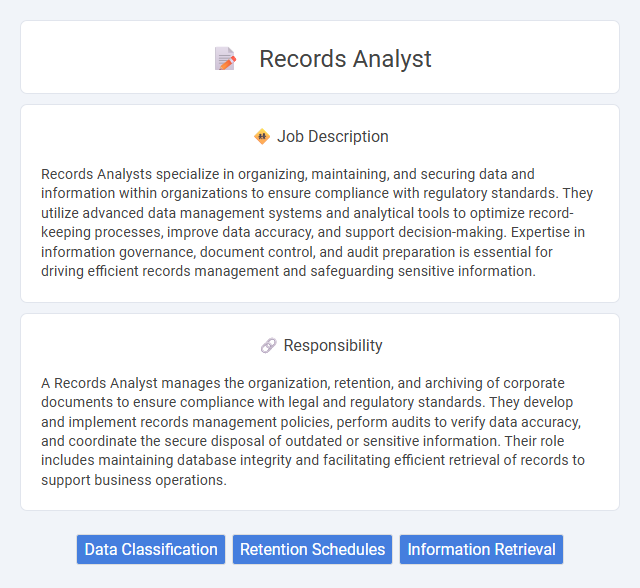
Records Analysts specialize in organizing, maintaining, and securing data and information within organizations to ensure compliance with regulatory standards. They utilize advanced data management systems and analytical tools to optimize record-keeping processes, improve data accuracy, and support decision-making. Expertise in information governance, document control, and audit preparation is essential for driving efficient records management and safeguarding sensitive information.
Individuals with strong organizational skills and attention to detail are likely to be well-suited for a Records Analyst role, as the job requires managing and maintaining accurate records. Those who prefer repetitive tasks or have difficulties with data analysis may struggle in this position, suggesting the need for a methodical mindset. Candidates comfortable working with databases and information systems probably find this career rewarding and manageable.
Qualification
A Records Analyst must have strong expertise in data management, including proficiency with records systems, metadata standards, and data compliance regulations such as GDPR or HIPAA. Candidates typically require a bachelor's degree in information management, library science, or a related field, alongside experience in auditing and organizing records for accuracy and accessibility. Advanced skills in data analysis software, record retention policies, and attention to detail are essential to maintain efficient information lifecycle management.
Responsibility
A Records Analyst manages the organization, retention, and archiving of corporate documents to ensure compliance with legal and regulatory standards. They develop and implement records management policies, perform audits to verify data accuracy, and coordinate the secure disposal of outdated or sensitive information. Their role includes maintaining database integrity and facilitating efficient retrieval of records to support business operations.
Benefit
A Records Analyst likely improves organizational efficiency by managing and safeguarding important data, which may lead to more streamlined operations and better compliance with regulations. This role probably enhances data accessibility, supporting informed decision-making across departments. Job holders might experience professional growth opportunities due to the increasing importance of data management in various industries.
Challenge
A Records Analyst likely faces the challenge of maintaining accuracy and consistency across vast amounts of data while navigating complex regulatory requirements. They probably need to adapt quickly to evolving technologies and data management systems, which can add layers of difficulty to the role. Managing time efficiently to ensure timely access and retrieval of records may also present ongoing challenges.
Career Advancement
Records Analysts play a crucial role in managing and maintaining organizational data, ensuring accuracy, compliance, and accessibility of records. Career advancement often leads to positions such as Records Manager, Compliance Officer, or Data Governance Specialist, where professionals oversee larger teams and strategic data policies. Developing expertise in data analytics, regulatory requirements, and information management systems significantly enhances promotion opportunities and salary growth within this field.
Key Terms
Data Classification
Records Analysts specializing in data classification systematically categorize and manage information to enhance retrieval, compliance, and security within organizations. They implement classification schemes based on regulatory standards such as GDPR, HIPAA, and industry-specific frameworks to ensure data integrity and accessibility. Expertise in metadata tagging, information lifecycle management, and secure data handling supports organizational efficiency and risk mitigation.
Retention Schedules
Records Analysts specialize in developing and maintaining retention schedules that comply with legal, regulatory, and organizational requirements, ensuring systematic data management. Retention schedules guide the appropriate duration for storing different types of records, optimizing space and reducing risk associated with data retention. Expertise in retention schedules enables Records Analysts to enhance information governance and support efficient records disposal processes.
Information Retrieval
Records Analysts specialize in information retrieval by managing and organizing vast datasets to ensure quick and accurate access to records. Utilizing advanced database systems and retrieval tools, they optimize data indexing and metadata tagging to enhance searchability and efficiency. Their expertise supports compliance and decision-making processes across various industries by maintaining data integrity and accessibility.
 kuljobs.com
kuljobs.com